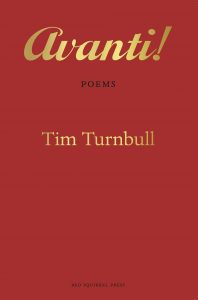Avanti!
 Tim Turnbull’s writing seems oddly familiar – and not just because we share a surname. His work evokes the sense within us that there is something more to our lives than the simple 9 to 5 routine. Avanti!, his fourth poetry collection, presents many Turnbull-esque qualities, for example he focuses on ‘adult lives blighted by human and political folly’. With the growing pressures of modern age, many can feel the same tension and frustration that Turnbull presents in his poetry.
Tim Turnbull’s writing seems oddly familiar – and not just because we share a surname. His work evokes the sense within us that there is something more to our lives than the simple 9 to 5 routine. Avanti!, his fourth poetry collection, presents many Turnbull-esque qualities, for example he focuses on ‘adult lives blighted by human and political folly’. With the growing pressures of modern age, many can feel the same tension and frustration that Turnbull presents in his poetry.
Entitling this collection Avanti! – or ‘to go forward!’, ‘come in!’– is ironic as Turnbull spends much of his time in the past. From mourning the dead to exploring the mysteries of the ancient Greeks, he is searching for the unanswerable. So why Avanti!? Perhaps it comes from the need to move on, rather than the push itself. Yet, it could also figure as a greeting in what seems to be this time-turning collection.
Turnbull presents a mixture of humour and gruesome imagery to suggest an understanding of this future. He creates a deadpan tone through his kicked-back style. Consider ‘Zimbardoland’ where he takes the horrific Stanford Prison experiment (where people adapted to the roles of prisoners and guards, resulting in mass violence) and finds parallels to the UK 2015 election. This placed the politicians on the same wavelength of the prison guards in their willingness to conform.
the subjects
in the interests
of efficiency
have been persuaded
to press their own buttons.Go on. Press it.
You know you want to.
Dark humour proves effective in Turnbull’s poetry. He draws the reader in, addressing them directly, luring them into the world of the poem. In this extreme comparison, he explores how society is pushed into corners through the tensions that are exerted to them. The short, snappy lines imitating the button pushing do this successfully.
However, I struggled to connect with Turnbull’s poetry in certain areas. There is a less tender side to Turnbull as he tends to mask vulnerability through his comedic twang. However, one poem where we begin to see a bit more sensitivity from Turnbull is ‘Happy Times, Old Man’. The poet is in the spotlight instead of in the rear-view mirror.
I have cut myself chopping kindling in
the wrong glasses.
The world he has come to understand through his exploration and ponderings over the years has turned ‘upside down’. We are stuck in a labyrinth of time. He effectively uses rhyme to swing us back and forward, uncertain to which way we are turning. For example, in his use of ‘chopping kindling’, the ‘ing’ imitates this swinging sound abruptly. The hard ‘ch’ sound created also imitates the blocking of swinging one way. Turnbull can no longer find the right meaning, but finishes through an understanding that,
None of this matters, but, more important
by far, is that it doesn’t matter that it
doesn’t matter: it is time to light the fire
(‘Happy Times, Old Man’)
This presents an interesting resolution of some his reflections on the world he inhabits. One must move forward until they can be fulfilled. The repetition used here brings us back to that ‘chopping kindling’. Everything returns to his imagery of fire. Life’s matter is in people’s personal stories.
Avanti! leaves the reader in the way it greeted them: puzzled. You are left to your own devices. The theme of time drives his investigation of our world. Yet, it is more than just time. It is the quality of our past, the richness of our myths and philosophy, that give us this meaning of life. The need to prove ourselves to be more than what we have seemed to be. These lines from the title poem ‘Avanti!’ speak this core message truly,
Steady.
my friend.
Let’s take
this one
step at
a time…
Now!
!Vamos!
Let’s go!

Excellent